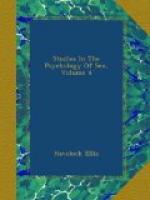Dr. J.N. Mackenzie (American Journal of the Medical Sciences, January, 1886) considers that civilization exerts an influence in heightening or encouraging the influence of olfaction as it affects our emotions and judgment, and that, in the same way, as we ascend the social scale the more readily our minds are influenced and perhaps perverted by impressions received through the sense of smell.
Odors are powerful stimulants to the whole nervous system, causing, like other stimulants, an increase of energy which, if excessive or prolonged, leads to nervous exhaustion. Thus, it is well recognized in medicine that the aromatics containing volatile oils (such as anise, cinnamon, cardamoms, cloves, coriander, and peppermint) are antispasmodics and anaesthetics, and that they stimulate digestion, circulation, and the nervous system, in large doses producing depression. The carefully arranged plethysmographic experiments of Shields, at the Johns Hopkins University, have shown that olfactory sensations, by their action on the vasomotor system, cause an increase of blood in the brain and sometimes in addition stimulation of the heart; musk, wintergreen, wood violet, and especially heliotrope were found to act strongly in these ways.[27]
Fere’s experiments with the dynamometer and the ergograph have greatly contributed to illustrate the stimulating effects of odors. Thus, he found that smelling musk suffices to double muscular effort. With a number of odorous substances he has found that muscular work is temporarily heightened; when taste stimulation was added the increase of energy, notably when using lemon was “colossal.” A kind of “sensorial intoxication” could be produced by the inhalation of odors and the whole system stimulated to greater activity; the visual acuity was increased, and electric and general excitability heightened.[28] Such effects may be obtained in perfectly healthy persons, though both Shields and Fere have found that in highly nervous persons the effects are liable to be much greater. It is doubtless on this account that it is among civilized peoples that attention is chiefly directed to perfumes, and that under the conditions of modern life the interest in olfaction and its study has been revived.




